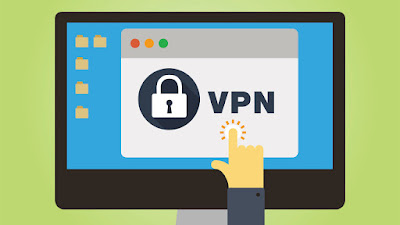WHAT IS VPN AND HOW IT WORKS?
"VPN" is a common term, especially in the context of remote teams, but do you know what it means? VPN is the acronym for Virtual Private Network. As the name suggests, a VPN creates a virtual space that you can operate in when you are online. But what are the real benefits?
What is a VPN for?
VPNs have many advantages for Internet users, whether at home
or in the office:
Remote
access
A VPN allows you to integrate certain devices into a private
network with remote access, which is ideal for telecommuters. This allows your
team members to stay connected safely, even if they are geographically far
away.
Reinforced
security
If you use Wi-Fi hotspots to connect, on the train on your way
to work or in a coffee shop, for example, a VPN can protect your data. Public
Wi-Fi can be handy, but it's not as secure as your internet connection at home
or at work. By creating a VPN tunnel (imagine a protective envelope around your
data), even if your Wi‑Fi connection is compromised,
your data is fully protected with AES (Advanced Encryption Standard). Your data
cannot be decrypted until it reaches its destination. So you can surf the Internet,
send e-mails or pay with credit cards in complete safety, even on a public Wi‑Fi
network. This is called PPTP.
Since a VPN hides your location and lets you choose a server in the desired region, you can view content from all regions of the world. If you were in China, for example, and wanted to access your favorite social networks, you would find that many of these sites are blocked. But by configuring your VPN to provide you with a US-based IP address, it's like browsing the internet from that country.
Cancel
some slowdowns
This does not apply to all VPNs and Internet Service Providers
(ISPs), but sometimes a VPN service can allow you to bypass certain
restrictions related to network traffic. For example, if your ISP starts
limiting your data after a certain threshold, a VPN can help you hide some of
your activity, which extends your data allowance. That said, using a VPN in
general can slow down your broadband connection, as it must be completely
rerouted through a VPN server. But generally, this problem is with home
broadband rather than business broadband.
How does a VPN work?
In short, a VPN hides your identity, location, and online
activity. When you connect to the Internet, your service provider (ISP) uses
its own servers to get you online. Since a VPN establishes this connection
through a private server, all data potentially transmitted by your computer
then comes from the VPN.
VPN providers use encryption and Internet Protocol Security
(IPSec) protocols to "wrap" your data so that it is protected until
it reaches its destination. This is called L2TP (Layer Two Tunneling Protocol).
When you surf the Internet, your Internet Protocol (IP) address is not the one
assigned by your ISP, but an IP address associated with the VPN server.
What is
an IP address?
An Internet Protocol (IP) address is a set of numbers that
identify your device when you connect to the Internet. This address therefore
constitutes a means of identification and location. In some cases this can be
beneficial: when a small business needs its website and location to be frozen
for local customers for example. If your team opts for a VPN connection, but
you still want to keep your IP address, there are VPNs that allow it.
The reason for hiding the IP address is that it can reveal
your location. If a hacker gains access to your IP address, for example, they
can view your recent online activity and potentially hack into your accounts.
But hackers aren't the only problem. Have you ever wondered why your social
media ads are so personalized? This is because your ISP sells information about
your internet activity. With a VPN, this is impossible, because your IP address
is hidden.
Why choose to use a VPN?
One of the main reasons to use a VPN in a work environment is
to securely connect members of a remote team. With increased security and
accessibility, your team can work more efficiently.
Enhanced trust online: With a VPN, you know your data is safe,
even when you share files.
Customer Trust: Customers have a right to
expect you to have an equally secure VPN or service before any document
exchange.
Remote Network: A VPN allows your
internal network to extend beyond the office.
Using a VPN
If you are planning to install a VPN service on your work
computer or those of your entire team, consider the following:
VPN
location: Will the VPN work for the chosen destination,
based on the location of the provider? For example, if you want to access a
blocked site where you are in the United States, you will need a server based
in a country that has access to the site. Make sure your VPN has servers there.
In addition, a VPN follows the rules of the country in which it operates, not
those of its customer's country (see below).
Type of
VPN: A VPN can be as simple as a plug-in or as extensive as a full
corporate VPN network. If your office is looking to improve its collaboration
tools, you will need to consider options for business.
Cost: The more
complex the VPN, the more it costs. For corporate VPN services, you are going
to need a bespoke IT solution which is usually a big investment.
Operating
Systems: You will need to choose a VPN service that is
compatible with your operating system. Linux and Microsoft Windows computers,
for example, may be compatible with different VPN clients.
Devices: If you
plan to use a VPN on your mobile devices, like your phone or tablet, you might
need a different VPN than your laptops.
What are the disadvantages of a VPN?
The advantages of a VPN are numerous, but they are not exclusive
to them. The telecommuting, for example, can be effective with other programs
or services that do not require much configuration, maintenance or expenses.
Be aware of the downsides of a VPN before you get started:
· Can be
expensive, especially in a corporate setup.
· Requires
in-house maintenance.
· A remote
network must be initially configured by an IT specialist: Dropbox only requires
a simple registration.
· Is not
always as secure as it looks.
· Can
significantly slow down your Internet connection.
· In some
countries, VPNs are illegal or borderline legal.
· Some
brands block users who use VPNs, so this can be a bad point on behalf of a
business.
At the end of the day, you have to think about what you are
really looking to accomplish with a VPN. Can you surf the web so freely using
an online proxy server? Can you maintain a high level of security with
up-to-date malware detection software and firewalls? If the answer to any of
these questions is yes, a VPN may be an unnecessarily complex solution.
Should my business use a VPN?
There are many benefits to using a VPN, but beware: the exact
type of VPN to use can mean the difference between a good tool and an
unnecessary expense. VPN is hard to beat when it comes to network-level data
protection, but a good total security infrastructure with malware detection software
can provide effective protection for your devices. Setting up and integrating a
corporate VPN takes time, and a dedicated IT specialist must keep it running
smoothly.




Comments
Post a Comment